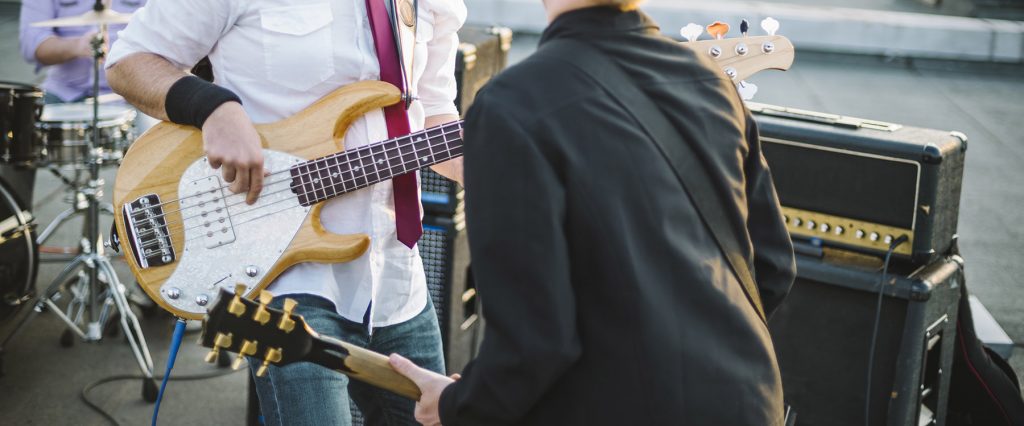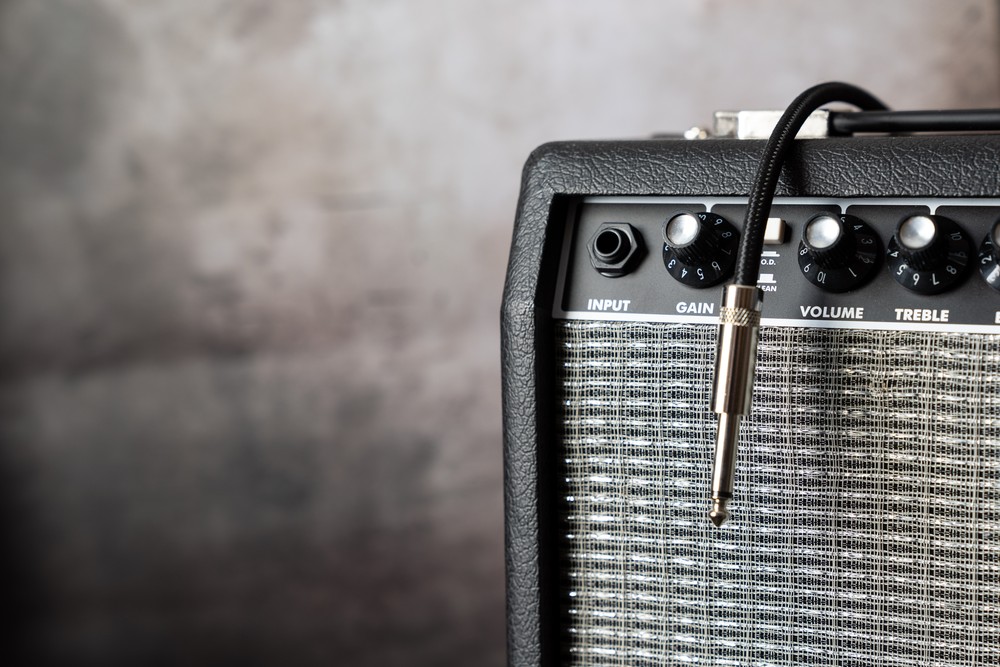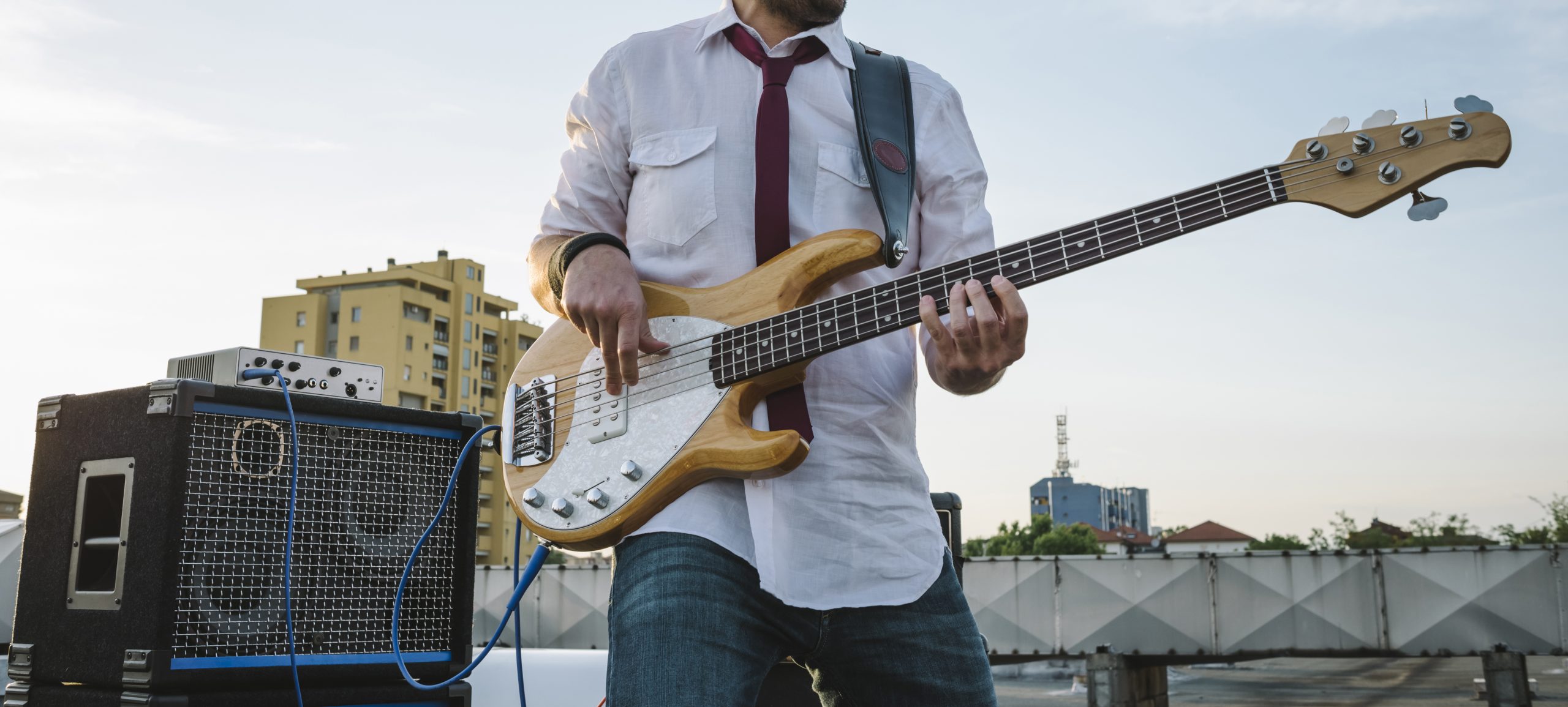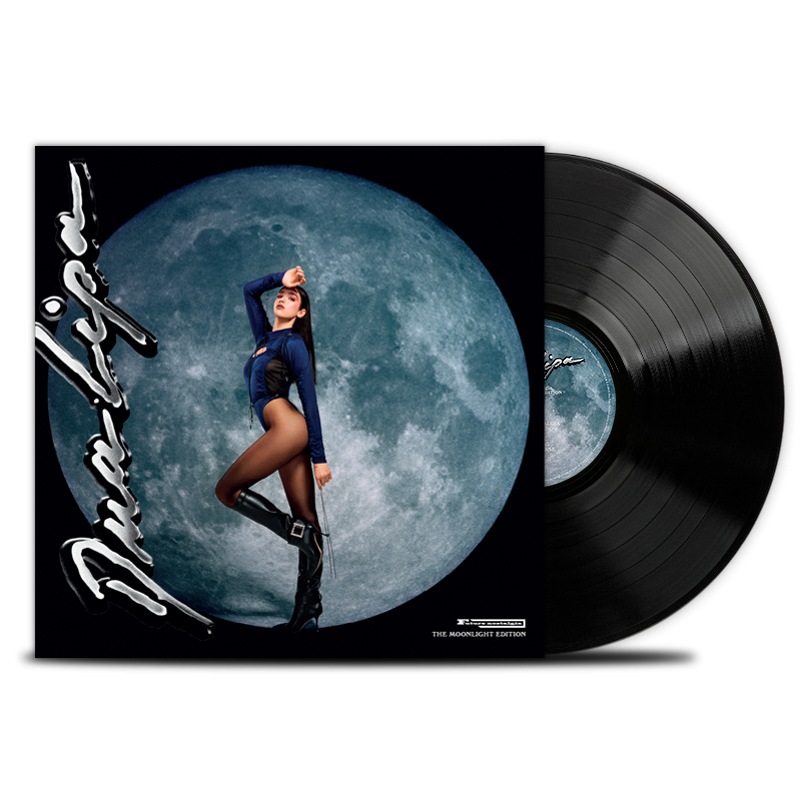The best amp for a bass guitar will have enough power to fill the room without distorting the sound. It should also have a wide range of controls so that you can tailor the tone to your liking. If you don’t know how to choose a bass amp for your instrument, we’re here to help you make the right decision.
You’ll also want a top amp for the best bass guitar to have a lot of features and controls that produce clean tones. Unfortunately, advanced models can also get quite expensive. Luckily, if you’re a beginner or amateur bassist, amps with fewer features and a compact size will still provide everything you need.
Keep reading to learn more about how to choose the right amp for a bass guitar.
Beginner’s Guide to Amps for a Bass Guitar
What are Amps for Bass Guitars?
Amps are an essential component of your bass setup because they take the audio signal from your bass and make it louder. You’ll find they come in all shapes and sizes, from small practice amps to massive head units that power entire stadiums. It’s important to consider the size and complexity of your bass rig, as well as the power output, or the amount of watts of power the amp can produce. The bass signal, or the electrical current representing the sound of your bass, should be strong and clear.
Most beginner and intermediate bassists will be looking for the best bass combo amp. Combo amps are self-contained units with both the amplifier and speaker built into one unit. This makes them more portable and easier to set up than separate amplifier and speaker units.
However, some amplifiers don’t have a built-in speaker. These are called “heads,” and they require you to purchase a separate head and bass speaker cabinet to use with them. Bass heads are usually only purchased by advanced bassists looking for a very specific sound.
Amps for Bass Guitars vs Traditional Amps
Amps for bass guitars are different than traditional electric guitar amps in a few ways. First, they have more power. A bass amplifier needs to reproduce the low frequencies of a bass, which requires more power than a regular guitar amp.
Second, they have different EQ controls. Bass guitars have a wide range of bass frequencies that need to be controlled differently than a guitar’s frequencies. For instance, most bass amps will have a “bass” knob that allows you to boost or cut the low frequencies. Because the reproduction of low sounds is quieter than high sounds, these amps give you the ability to boost your bass volume.
Third, many bass amps have built-in effects like reverb, chorus, and delay. These effects can help create a fuller sound when playing with a band.
Finally, bass amps usually have a built-in compressor to even out the sound. This is because bass guitars tend to have more extreme peaks and valleys in their sound than a guitar.
How Amps for Bass Guitars Work
Amps for bass guitars work by taking the audio signal from your bass and amplifying it. The amplified signal is then sent to a speaker, which reproduces the sound of the bass. A bass amp head, or the main component of a bass amp, is crucial for determining the overall tone and power of your system. The gain control, or the level at which the amp amplifies the bass signal, is also important for shaping your sound.
The speaker is what actually produces the sound that you hear. As the amp receives the audio signal, it amplifies it by increasing the voltage. This increase in voltage causes the current to increase as well, which makes the speaker move more. The speaker then converts the amplified signal into sound waves, which are sent out into the air and eventually reach your ears.
Most amps have a variety of controls that allow you to shape the sound of the amplified signal. For instance, you can use the EQ controls to boost or cut specific frequencies. You can also use the effects controls to add effects, such as reverb or delay.
To use an amplifier with your bass guitar, you first have to connect the two. Most basses have an output jack on the side or back of the instrument. This jack is where you’ll connect a cable that goes from your bass to the input on your amplifier.
Once you’ve made the connection, you can turn on your amp and start playing. Be sure to start with the volume control turned down low. Doing so will help you avoid feedback and protect your ears from the loud sound of the amp.
As you start playing, you can slowly turn up the volume until it’s at a comfortable level. You can then use the EQ controls to shape the sound to your liking.
Why Should You Buy an Amp for Your Bass Guitar?
If you’ve just invested in a new electric bass guitar, you’re going to need an amp. On its own, an electric instrument won’t be very loud because the solid body lacks resonance. So, if you want to play with others or want your bass to be heard by a crowd, a bass amp is a worthwhile investment. This type of amp will greatly improve your performance. Of course, if you already have an amp for your bass guitar and start to detect a rattle in the speaker when playing, consider upgrading to a newer model.
Are Amps for Bass Guitars Worth Buying?
- They amplify your sound: This functionality shouldn’t be overlooked because it’s the main reason you need an amplifier for your bass guitar. A good amplifier will make your bass sound louder and fuller, which is great for practice and performance.
- They have built-in effects: Many amplifiers come with a variety of built-in effects that you can use to shape your sound. These range from simple effects, such as reverb and delay, to more complex effects, such as chorus and flanger. Having these built-in effects can save you money because you won’t need to buy separate pedals to get the same results.
- They have EQ controls: Most amplifiers will have some form of EQ control. This is important because it allows you to boost or cut certain frequencies. This can help get rid of unwanted feedback or shaping your sound to better match the rest of the band.
- They have a variety of input and output options: Amplifiers usually have multiple input and output options and channels, giving you a lot of flexibility when connecting your amplifier to other devices. For example, some amps have an aux input, which allows you to connect a CD player or MP3 player. Other amps have an effects loop, which lets you connect pedals between the bass preamp and power amp stages. You can also find bass amps with headphone outputs, so you won’t bother anyone else while playing.
- They’re built to last: Amplifiers are durable. They’re made with tough materials that can withstand being moved around from gig to gig. This means that you won’t have to replace your amplifier as often as you would with other types of musical equipment. To protect your bass, you may want to invest in the best stand for your bass guitar.
- They’re expensive: Depending on the model, an amplifier for a bass guitar can be quite expensive. If you’re on a tight budget, an amp might not be the best option for you. However, you may want to evaluate other accessories like headphones, smartphones, computers, or multi-effects pedals that can enhance your playing sessions, even without an amp.
- They require maintenance: Like any piece of electronic equipment, amplifiers require some maintenance. This includes things like replacing tubes and cleaning the inside of the unit. If you’re not prepared to do this, an amplifier might not be the right choice for you.
- They’re heavy: Amplifiers are often quite heavy, which can be a problem if you carry your amp to and from practice or gigs.
- They take up a lot of space: In addition to being heavy, amplifiers can also be quite large. This means that they can take up a lot of space, which can be an issue if you have limited storage space.
How Long Will an Amp for Bass Guitars Last?
An amplifier for a bass guitar is a long-term investment. If you take care of it, it can last for up to 10 years. Of course, this depends on the model and make of the amplifier. High-end models will usually last longer than low-end models. However, if you don’t maintain it properly, it will likely need to be replaced sooner.
The power supply is the most likely part of your amplifier that will go bad first. Power supplies are constantly being taxed, so it’s not surprising that they sometimes fail. The good news is that they are relatively easy to replace.
The next most likely part to fail is the preamp. The preamp is responsible for amplifying your signal before it goes to the power amp. If the preamp fails, you’ll likely need to replace the entire amplifier.
The last part that could potentially fail is the power amp. The power amp is responsible for amplifying your signal before it goes to the speakers. These components are very reliable, so it’s unlikely that you’ll ever need to replace yours. However, if it fails, you’ll need to buy a new amplifier.
Keep in mind that these are just estimates. The actual lifespan of your amplifier will depend on several factors, such as how often you use it, how well you maintain it, and the quality of the components.
How to Choose an Amp for a Bass Guitar

When shopping for an amplifier for your bass guitar, you need to evaluate several factors. First, think about the functionality you need. Next, consider the size and weight of the unit, and finally, factor in your budget and the brand you might want.
Best Amp for Bass Guitars Key Factors
1. What kind of extra features should I look for?
The first thing you need to think about is functionality. Do you need an amp with multiple input and output options or an effects loop? What about a built-in tuner? Make a list of features you need, and narrow down your choices.
Look for a bass amp with a variety of tone controls and settings, as this will allow you to fine-tune your sound and get the most out of your bass guitar. The gain control, or the level at which the amp amplifies the bass signal, is also important for shaping your sound.
The amp head is a crucial component that determines the overall tone and power of the system, so look for one with plenty of power and a range of tone controls. If you’ll be playing with other bass players, consider a bass amp with a built-in DI or preamp to easily connect to a mixing console or recording device.
Remember to consider the playing style of music you’ll be playing and the type of sound you want to achieve too. This will help you determine the right type of amp for your needs.
Extra features will most likely increase the amplifier’s price and could also make it larger and heavier, so it’s important to choose only the features you think you’ll need or use regularly.
2. Does the size of my amplifier matter?
The next thing you need to consider is the size and weight of the unit. Amplifiers come in various sizes, from small combo amps to large stacks. You need to choose an amp that’s the right size for you. Consider how much space you have and how easy it is to transport the amp. The bass cabinets, or speakers, are also important for the overall sound of your amp, so consider the size and number you’ll need based on the venues you’ll be playing in and the volume level you’ll be playing at.
If you’re constantly going back and forth between gigs, you may not want something large and heavy. On the other hand, if you’re a paid artist playing larger venues, a large professional amp with better power ratings may be something you need.
If you only plan to use it at home, think about where you’ll put it and how much room you have. You may not have the space to dedicate to a larger unit.
3. How much do I want to spend on my amp for a bass guitar?
You also need to think about your budget. Amplifiers can range in price from a few hundred to several thousands of dollars. Choose an amp that’s within your budget while still considering the other factors on this list. For example, don’t sacrifice features or quality just to save a few dollars. You’ll likely end up regretting it in the long run.
4. What amplifier brand should I buy?
Several brands make amplifiers for bass guitars. Some of the more popular brands include Ampeg, Orange, Mesa Boogie, and Hartke. Do some research on the different brands to see which one might be the best fit for you.
Budget brands that make good practice amp options include Peavey, Crate, and Carvin. These brands make more affordable amplifiers, but they may not have all the features or be as well-constructed as the high-end brands.
Mid-range bass amp options include Gallien-Krueger, SWR, and Warwick. Their amplifiers are a step up from the budget brands in terms of features and quality.
High-end brands include Markbass, Fender, and Acoustic. These brands make amplifiers that are the best of the best. They’re usually more expensive, but they’re also made with better materials and have more features.
Best Amp for Bass Guitar FAQs
Does speaker size matter?
The size of the speaker doesn’t necessarily matter. It’s more important to consider the wattage rating and the type of speaker. A higher wattage rating means that the amplifier can produce more power, which is good if you’re playing gigs or large venues.
Keep in mind, though, that a larger speaker may be able to handle more power, but it will also be heavier. So, it’s really a matter of personal preference.
What’s the difference between a combo amp and a head?
A combo amp is an amplifier that has the speaker built-in. A head is just the amplifier without the speaker. You’ll need to buy a separate speaker cabinet to use with a head.
Heads are usually more expensive than combo amps, but they’re also more versatile. You can mix and match different heads and cabinets to get the sound you want.
What’s the difference between a tube amp and a solid-state amp?
Tube amplifiers use vacuum tubes to amplify the signal. They’re generally more expensive than solid-state amplifiers, but they’re also more responsive and have a warmer sound.
Solid-state amplifiers use transistors to amplify the signal. They’re less expensive than tube amplifiers, but they don’t have the same tonal range.
Which bass guitar amplifier should I buy?
The best bass guitar amplifier for you depends on your budget, the type of music you play, and your personal preferences. A budget-friendly amp might be all you need if you’re just starting out. If you’re a gigging musician, you may want something with more power. Do some research on the different brands and types of amplifiers to find the one that’s right for you.
What do you need an amplifier for?
An amplifier is an important part of any bass setup. It takes the signal from your bass and makes it louder. It also shapes the sound of your bass, so it’s a good idea to get an amp that has the features you want.
How much power do I need?
The amount of power you need depends on how you’re using your amplifier. If you’re just practicing at home, you might not need a lot and can opt for a cheap bass amp, but you’ll need more powerful types of bass amps if you’re part of the group of professional bassists that play at gigs or large venues. By looking for a bass guitar amp with plenty of power, that powerful bass amp will allow you to achieve a wide range of bass tones and bass output.

















